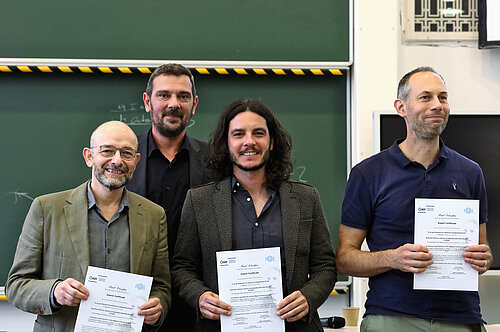THE PAUL EHRENFEST BEST PAPER AWARD FOR QUANTUM FOUNDATIONS FOR THE YEAR 2023
The Paul Ehrenfest Best Paper Award for Quantum Foundations recognizes outstanding and influential research contributions to the foundations of quantum physics. The award aims to raise awareness for the quantum foundations field and draw attention to new and interesting achievements in this area without delay. It is awarded for the most significant paper in the foundations of quantum physics, theoretical or experimental, published in a peer-reviewed journal in the five calendar years before the prize call (i.e., this year, we will accept submissions published between January 1st, 2018, and December 31st, 2022). Other than that, papers from all areas in the foundations of quantum physics and by authors of any background are eligible for the award. For the detailed rules, please click here.
The Paul Ehrenfest Best Paper Award 2023 has been jointly awarded to the authors of three papers for their work on extended Wigner's friend theorems:
In these papers, the authors extend Wigner's famous thought experiment by combining it with aspects of Bell's set-up, thereby constructing a variety of closely related no-go theorems. These theorems challenge the applicability of quantum mechanics to arbitrary physical systems, including macroscopic objects and observers, paired with various assumptions, such as the absoluteness of measurement outcomes or certain locality assumptions, some of which are weaker than those in Bell's theorem or the Kochen-Specker theorem. As a result, these theorems provide new challenges for the interpretation of quantum theory, forcing us to make some hard choices in our conception of quantum reality.
The members of the selection committee of the Paul Ehrenfest Best Paper Award for Quantum Foundations 2023 were:
* Borivoje Dakić, University of Vienna & IQOQI Vienna, Austria
* Philip Goyal, State University of New York at Albany, USA
* Lucien Hardy, Perimeter Institute, Waterloo, Canada
* Marcin Pawlowski, University of Gdansk, Poland
* Urbasi Sinha, Raman Research Institute, Bangalore, India
The selection of the award-winning publications was achieved by a vote of those committee members who had no conflict of interest.

